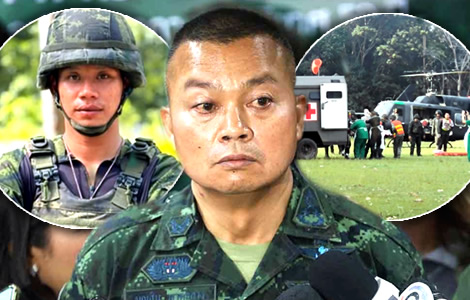A Thai soldier lost his foot to a newly planted Cambodian landmine near Surin on Wednesday, prompting army commanders to plan a serious, potentially escalatory military response as tensions surge dangerously along the volatile Thai-Cambodia border.
Yet another Thai soldier, the sixth, has been maimed on the volatile Thai-Cambodian border. On Wednesday afternoon, a Russian-made PMN-2 landmine exploded near Ta Kwai Temple in Surin province, ripping off Private Adison Pomklang’s right foot. Furious and visibly shaken, 2nd Army Commander Lieutenant General Boonsin Padklang blamed Cambodia outright, accusing its forces of laying plastic-encased mines that evade standard detection gear. “This was no accident,” he said. The blast is the latest flashpoint in a border standoff spiralling toward crisis.

Thai military commanders are preparing a serious and potentially escalatory response after another soldier was maimed by a landmine near the Cambodian border. The incident, which occurred on Wednesday, is the latest in a rising number of explosive injuries tied to newly deployed landmines.
The explosion happened at approximately 3:45 p.m. near Hill 350. The site is adjacent to the historic Ta Kwai Temple ruins in Surin province. This area, heavily contested by both Thai and Cambodian troops, has become one of the most volatile flashpoints on the border.
Private Adison Pomklang of the 1st Infantry Battalion, 23rd Infantry Regiment, was the latest victim. While on a routine patrol, he stepped on a PMN-2 anti-personnel mine. The device exploded with devastating force. As a result, his lower right leg was blown off in what medics described as a traumatic amputation.
Thai soldier loses lower leg to PMN-2 landmine near Ta Kwai Temple in Surin province during a routine patrol
Immediately, emergency teams responded. Fellow soldiers carried him to safety and transported him to Phanom Dong Rak Hospital. However, his condition remains serious. A public call for O-type blood donations was issued within hours of the incident. The Army’s official Facebook page urgently requested help from residents in Surin province.
Two other soldiers were also injured in the same incident. Sergeant Major Natthaphong Sichin sustained minor injuries from shrapnel to his back. Meanwhile, Private Thanonthorn Thaokratok was wounded in his left wrist. Both are now recovering, but their injuries add to the growing toll of this border conflict.
So far, six Thai soldiers have been maimed or seriously injured by landmines since July alone. According to Thai officials, all of the injuries have occurred inside Thai territory. These claims are now at the centre of a deepening diplomatic crisis.
Lieutenant General Boonsin Phadklang, Commander of the Second Army Region, publicly condemned Cambodia for planting the mines. Speaking just hours after the incident, he called it a direct violation of the bilateral ceasefire agreement and international law.
Military condemns Cambodia for planting undetectable mines in violation of ceasefire and international law
Crucially, Lt. Gen. Boonsin pointed out that the PMN-2 mines are made of plastic. Therefore, they cannot be detected by standard metal detectors. He stated, “These are not leftover mines from old conflicts. These are newly planted and deliberately placed to target Thai patrols.”
Notably, the PMN-2 is a Russian-designed anti-personnel mine. It is banned under the Ottawa Treaty, which both Thailand and Cambodia are party to. Despite this, Thai forces report finding the devices in “new condition,” suggesting recent deployment.
Thailand has already lodged a formal diplomatic protest with Phnom Penh. Officials say this marks a serious deterioration in bilateral relations. Tensions, they warn, are rising fast — and dangerously.
Although talks between the two countries continue under the Malaysia-brokered ceasefire framework, incidents like this are eroding trust. Thai military sources say that since April, Cambodian troops have been moving unilaterally into disputed territory. They describe these movements as provocative, coordinated and aggressive.
Back in May, the situation escalated when a Cambodian soldier was killed while operating inside Thai territory. That death marked a turning point. Since then, both sides have hardened their positions. Although Thailand has maintained a largely defensive posture, officials are now openly discussing the right to retaliate.
PMN-2 plastic mines mark a serious threat of escalation in border tensions between Thailand and Cambodia
In a statement issued by the Defence Ministry, Thailand reiterated its right to self-defence under international law. The statement noted, “If these violations persist, Thailand will be forced to respond. Our sovereignty must be protected.”
The growing crisis is also creating tension in local communities. Many of the disputed areas are home to Cambodian refugees who have lived there for decades. At the same time, Thai landholders are pushing for official title deeds to claim land they say is rightfully theirs.
As a result, new barbed wire fences and military checkpoints have appeared in formerly neutral areas. These barriers, Thai commanders argue, are essential for national security. However, Cambodian villagers view them as signs of creeping annexation.
Meanwhile, Cambodian authorities have been accused of trying to absorb these long-established refugee settlements into their national territory. Consequently, Thai officials believe the landmine attacks are part of a broader effort to destabilise the region and challenge Thai control.
Disputed border zones see new fences, checkpoints and rising tensions between two local communities
Military engineers have now been deployed to inspect and clear affected zones. Patrol teams have been ordered to change their routes and increase spacing to reduce further casualties. Additional surveillance drones are now operating in the skies over Surin.
At 6:20 p.m. on Wednesday, another alarming report emerged. Troops from the 22nd Infantry Regiment, patrolling between bunkers 11 and 12 west of Prasat Ta Kwai, also triggered a PMN-2 device. That explosion, too, injured soldiers who were rushed to hospital.
So far, at least nine personnel have been injured in these blasts in under eight weeks. Authorities believe the real number may rise. Field inspections are still ongoing, and engineers suspect other mines remain buried along active patrol routes.
Despite mounting injuries, Thai officials continue to stress restraint. Foreign observers have acknowledged Thailand’s disciplined response. International praise has come from diplomats in the ASEAN bloc and several Western embassies.
Repeated mine blasts raise casualty numbers as Thailand continues restrained and disciplined border operations
Nevertheless, anger is growing within the Royal Thai Army. Commanders now say the use of landmines by Cambodian forces is “insidious and calculated.” Privately, some Thai officers believe Cambodia is using the tactic to provoke a military response that would then be used for propaganda purposes.
The broader geopolitical context is also adding pressure. Sources inside Thailand’s Foreign Ministry believe the destabilisation may be linked to shifts in Cambodia’s internal power structure. Former Prime Minister Hun Sen and his family are reportedly losing influence. This has been linked to an inability to pay civil servants and, indeed, soldiers.
Recently, Cambodia launched a crackdown on illegal scam centres operating within its borders. This has exposed deep fractures within the ruling elite. Simultaneously, pro-democracy movements abroad have begun criticising the Cambodian regime. These combined pressures may be prompting Cambodia’s military to assert power elsewhere — particularly along the border.
As tensions rise, Thai security agencies are monitoring political developments in Phnom Penh closely. While Thailand does not wish to escalate the conflict, the army has begun preparing options for a calibrated military response.
Cambodia’s internal pressures and political instability driving aggressive border actions against Thailand
For now, however, the focus remains on treating the wounded and securing the danger zones. Thai commanders are urging calm but also readiness. “We will not provoke,” said one high-ranking army officer, “but we will not be passive victims either.”
The government is expected to raise the issue at the next ASEAN security forum. Thailand wants a regional review of the ceasefire agreement and new enforcement measures. Meanwhile, calls for international monitoring of the border are gaining support.
Tensions flare on Cambodian border at Sa Kaeo with locals herded by officials to confront Thai soldiers
Cambodia apologises for soldier on Tuesday who was ‘drunk’ when he interfered with ASEAN border visit
2nd Army chief warns Acting PM Cambodian regime cannot be trusted and that border must stay closed
Yet on the ground, soldiers are bleeding. Explosions continue. Families are waiting in hospitals, hoping their loved ones will recover. And all the while, mines — hidden, silent, and deadly — lie beneath the soil, waiting for the next step.
Until concrete action is taken, this conflict will likely deepen. The question now is whether diplomacy can catch up to military developments — or whether the next explosion will be the one that ignites something far bigger and indeed uncontrollable.
Join the Thai News forum, follow Thai Examiner on Facebook here
Receive all our stories as they come out on Telegram here
Follow Thai Examiner here
Further reading:
US turns down Thai request for advanced F35 fighter jets but offers less expensive F16s and F15s
China could be an economic time bomb sitting on Thailand’s doorstep as Evergrande collapse nears


















